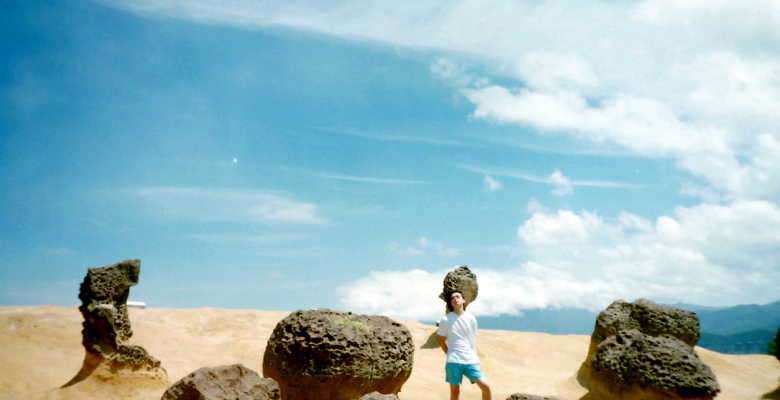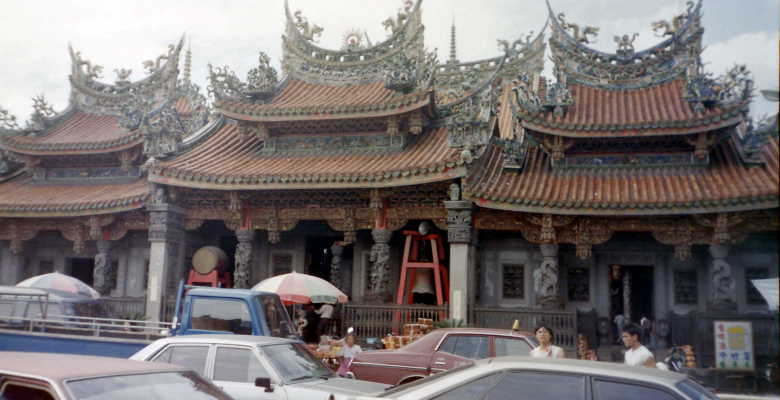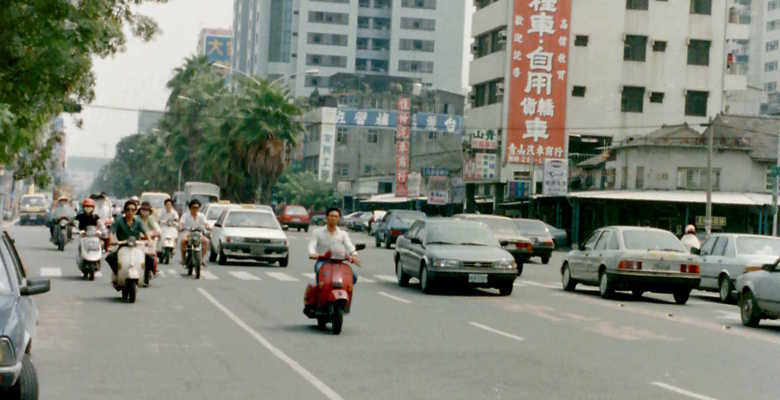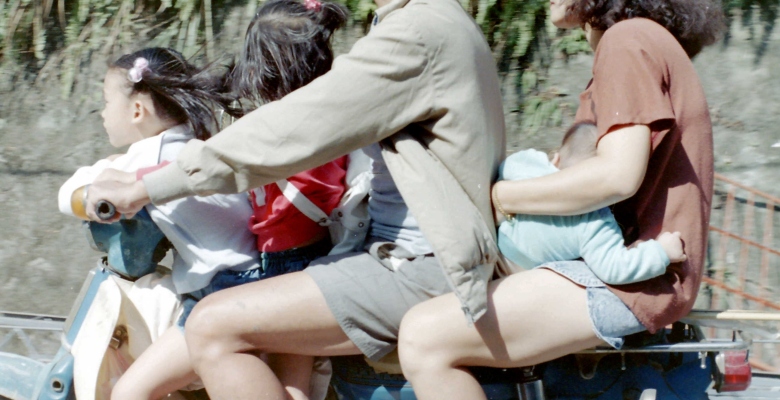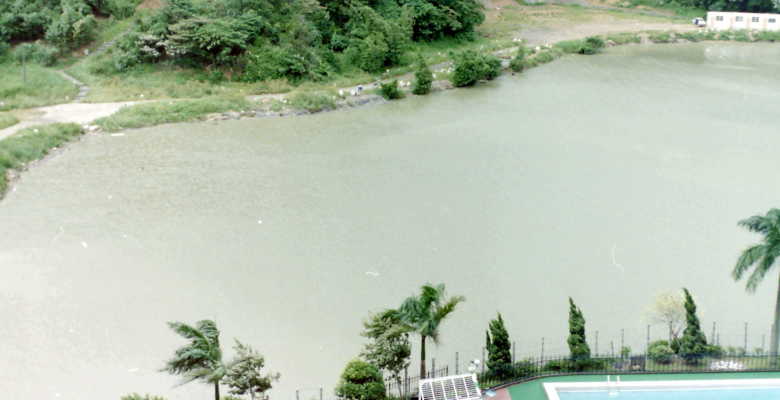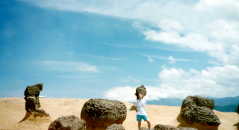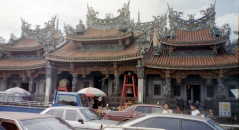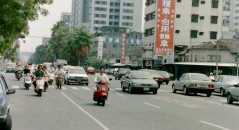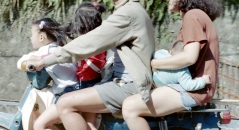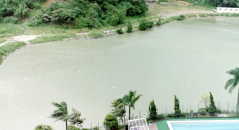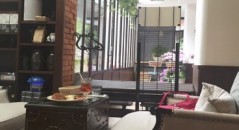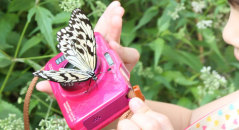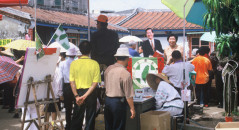Looking back to our trip to Taiwan in 1989, it seems like a coincidence that we were dispatched to Taiwan, since it was a place I was so familiar with.
The timing was bittersweet. By that time, my father was quite ill, and suffering the ravages of dementia. We had never been able to make the family trip to Taiwan that he had hoped for. He wasn’t even able to tell me where he had lived and worked or much else about his time in Taiwan; his memory was failing greatly. So I had to rely on my own memories of that time in 1972, and there wasn’t enough time to dig up his old letters and pictures.
We had only 2 weeks to prepare for our move to Taiwan. We learned that we’d be moving into a furnished apartment in Neihu that would be vacated once another Canadian family moved out.
I remember arriving In Taipei just after midnight. My first impression of Taipei was formed as I looked out the window of the taxi we took to our hotel—seeing people on scooters zipping by, their clothing flapping phantom-like in the dark. It’s kind of late for fun on scooters, I thought sleepily. In the days ahead we learned that these were a major form of transportation, and often whole families would be precariously perched on the family scooter. Of course to us it looked quite unsafe.
The next week was spent in the now- gone Beverly Plaza Hotel, recovering from jet-lag while my husband got started at work. I knew that Taiwan would seem a foreign place, and it was indeed. There were things that struck me the most at first. The heat. It was August when we arrived, and the summer heat and humidity (oh, the humidity!) was at its summer peak. No wonder Dad had talked so much about air conditioning. As well, I wasn’t ready for the complete lack of English in all places—street signs, shops, restaurants. Not even pinyin, which would have helped. That was the most difficult, since I hadn’t been able to learn Chinese the way my father had. There was no English language TV at all. The only English media was a radio music station which I listened to often, and a small English language newspaper. Of course there was no internet in 1989. So I felt very cut off from the outside world.
Another major thing we noticed was the traffic. I’ve heard of the late 1980’s being referred to as the ‘Dark Ages’ of traffic in Taipei. These were the days before the MRT, and while there were buses, the majority of people, or so it seemed, drove cars or rode on scooters. There were thousands of scooters, not the bicycles of my father’s time. This, combined with the extreme humidity, resulted in nasty rush hours and a rather significant air pollution problem. And the Taiwanese didn’t just drive, they drove aggressively, and until I got used to it I very nearly got hit while crossing roads. Apparently, traffic lights were ‘for reference only’ as one Taiwanese told us. That is, stop at a red light if you feel the need, and by all means go on a green no matter what’s ahead. Pedestrians were invisible. Surprisingly there was little or no honking of horns, or road rage as we know it in North America. We were lucky enough to have a car and driver assigned to us by my husband’s employer, since like most companies they didn’t want the complications of having an employee in a car accident. But I do remember sitting in some significant traffic jams. The only place I’ve seen that was worse, was Bangkok which we visited on our way home. I think that greatest difference between Dad’s experience with Taiwan and mine was the much greater number of people, and the even greater number of cars and scooters. Mine was a more urban experience.
We moved to our apartment in Neihu after the first week. Living there, on the outskirts of the city, the air was cleaner but we had to rely on our driver for the most part to get around. Having a driver was a both a godsend and a novelty. Our driver spoke some English, was often a good source of information, and frequently acted as a translator. He helped me learn a few words of Chinese and I’d teach him the idiosyncrasies of English. As we got out and about on weekends, I soon found that temples were my favourite places to visit and as I later found out they were Dad’s too. Their undeniably exotic architecture and ambiance were fascinating, to a Westerner anyway. My visiting Chinese in-laws just thought I was finally becoming religious.
These were the days before the internet, and it was hard to stay in touch with the family at home. We wrote letters, and eventually made a few phone calls to keep in touch. Dad struggled to follow what was going on, and was unable to tell me where the reactor project was, or where he had lived. He did vaguely warn me not to be too obvious about asking about the reactor. I tried the expat community for assistance, and was directed to a facility in northern Taiwan, which I later found out wasn’t it. Then my Mom sent me a return address she found, on Roosevelt Road. So I had the driver take me there, and I took pictures there as well, but it was a rather nondescript office building. These were all the things I had to go on.
After a couple of months we went back to Canada. I finally had time to sort through all the letters and mementos that Dad had sent us from Taiwan, and collect them all in one spot. It was only then that I pieced together the exact location of the reactor project and the place where Dad lived, as well as the places in Taiwan that were meaningful to him. My visit had been an opportunity lost. Sadly my father passed away 2 years later. It was too late. For the next 25 years, while I raised the children and took care of day to day life, all I could do was dream of going back to Taiwan.
It truly seemed like an eternity, but I did get to return to Taiwan earlier this year. I was pleased, as we landed, to see that the airport itself looked like it must have been there in the 80s. Much has changed, however. Untold busloads of tourists now crowd the parking lot of the National Palace Museum, disgorging hundreds of mainland Chinese tourists. Perhaps their homeland is having the last laugh, as its citizens crowd the hallways and block access to many of the main exhibits.

